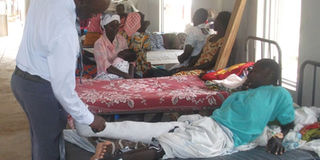Prime
Gulu Hospital short of space

Dr Onyachi talks to a patient at the female ward recently. Photo by Cissy Makumbi
Gulu Regional Referral Hospital, the biggest health facility in the region is grappling with acute shortage of space for patients admitted to different wards as the number of people seeking treatment at the facility has sharply risen in the last two years.
The hospital’s wards for both women and men are most affected by congestion. There is reportedly limited space between patients’ beds.
The director of the hospital, Dr Nathan Onyachi, attributes the problem to the hospital’s failure to get land for expansion, saying the number of patients the hospital handles has since tripled but no adjustments in space have been done. “The wards are meant to handle only 250 beds but for now due to the increasing number of patients, 367 beds have been squeezed in, leaving patients vulnerable to other contagious diseases,” Dr Onyachi said.
He added that the current patients’ admission rate requires 1,500 beds which calls for construction of more wards. Dr Onyachi also said instead of the hospital siting on 15 acres of land, it currently sits on only five. He also noted that acquiring extra land for the hospital’s expansion has been a big challenge because the hospital administration failed in its bid to solicit for it.
The pressure of land shortage extends further to affect staff welfare with only 50 out of the 350 of the hospital’s employees residing within the hospital premises while the rest continue to rent elsewhere.
Nurse to many
The hospital, commonly known as Gulu Hospital, is one of the 13 referral hospitals in the country which serves the districts of Amuru, Nwoya, Gulu, Kitgum, Lamwo and Pader. The hospital also serves as a teaching centre for Gulu University medical students.
As one of the designate hospitals of the 15 internship hospitals in the country where graduates of Ugandan medical schools can serve one year under the supervision of qualified specialists and consultants, several patients attach importance to its services, but retaining the graduates has always been a constrain mainly due to lack of accommodation.
During the Lord’s Resistance Army insurgency, aid agencies supported the hospital’s rehabilitation efforts but its expansion was equally challenged by land shortage.




